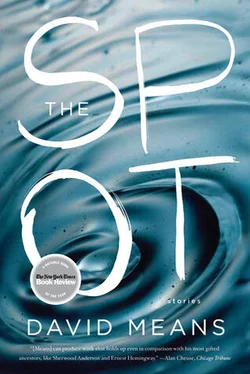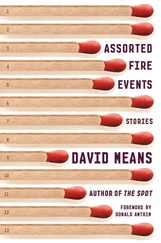The part when the guns go off and the horn doesn’t honk: There is a random anarchy of the moment — amid the yelling, the shouts, the fear — smoothed by the swaying willow branches, which make a soft, almost broom-sweep sound against the chain-link fence; men face one another with weapons drawn in a standoff, posited, posted, tensions created; the wiry guard is stark-still, frozen, producing more fear in Byron because the immutability, the cold posturing seems — and this is a quick mind-flash — inhuman, his eyes unmoving. The larger guy sways on his heels, both arms out with his gun. The swaying is imperceptible to everyone except August; August, too, is moving a little, and he feels, amid the conjoining of many sensations, an awareness of his weight and heft, hanging over his belt, tightly packed in his legs, as a significant disadvantage. He is a large target. But he is too involved in the tension, in the urgent dynamic before him, to think too much about this fact. The entire thing resolves itself down into those positions, into that tension, into the guns drawn and the directions they are pointed while, from the car, from her vantage, she watches and tries to see and sees only one side, one angle of the action: two men dressed in uniforms of pale olive, with stitched patches indicating their names, one fat and one thin, standing fearfully with their guns out, beneath the direct implications of the noon sun; Byron and August out of sight, positioned almost behind the truck, just their guns visible, pointing; the bags of money weighty and heavy at the feet of the larger man; all frozen there for a moment in the fear and agony until there is the flash of muzzle fire and then — in what seems to be a modulated time/space, not slow motion but rather something else, a kind of compact glimmering shimmer of movement — the fat man falls to the side, collapsing under the weight of his torso as his knees give, falling to the ground and then bowing down, prayerfully, his dark oil-slicked hair glinting in the light and his scalp bright red with sweat until another bullet hits and the top of his skull flowers with bone and spray; then the other man falls, too, his lean, slim body folding over sidelong and leathery; his own bones frail and delicate so that he appears to come down to the earth with a sliding motion, like a leaf in the wind, crumpling over himself.
All noise and commotion held off for a moment until she realized that she had honked the horn and was leaning on it too long; that behind her in the parking lot a lady, pushing a cart, had paused to look over and was coming toward her; that she was still on the horn, the sound bending and turning in on itself; and the men were now waving to her to stop, lugging the bags in her direction, Byron with two to balance himself and August just two-fisting the bags in one hand while he waved his gun wildly in the other; she realized that behind the lady, far off at the entryway of the lot, there was the flash of red light indicating a cop coming, and then another flash of light behind it, all under that bright noon sun with the swish of willows to her left and beneath that, down past the chain-link, a musky earthen smell of the river that seemed to bring the whole scene — the cracked dirty macadam, the green Dumpsters stenciled with white lettering, the drab back doorways (each painted a russet color) — into some congruence with the natural world, the everlasting world that would eternally outlast these stupid sinning willful men who were dying by their own clock. So when she backed up and around to escape she was thinking of that smell, and of the river, and she turned too fast and struck the lady with the car, clattering her load, spilling her cart and sacks of groceries and knocking her to the ground. (She was an older lady, not so enfeebled but frail-looking, in a long smocklike coat, pale yellow, with eyeglasses of wire rims and a duskylooking hairdo, pulled up; she was one of those old ladies who went to the beauty parlor weekly and had her bouffant arranged and neatened and listened to the patter and gossip but with a certain reserve; she was originally from St. Louis and had a certain composure that came from the Middle West and still, at times, found herself strangely and oddly out of place in her New Jersey town, right on the border of New York.) The men shouted to her to stop and not to go, holding the bags up and then coming over and trying to stand in front of the car to block her way and to limit her options to two: to drive over them and kill them or to stop and let them aboard, to hold off; Byron had his gun forward and was trying to find her face through the glare of the windshield and she knew, right then, seeing him, that if need be he would shoot her and be done with it, because he had shown, in his beatings, that he had the capacity to hurt without thought and that his body was at times out of his control. He held the gun out and sighted along it and said stop and she did; she did stop for a moment, until she continued into her reverse turn, moving the car around the lady, who was trying to clamber up, and then swinging forward so that she was facing the police cars, which were wending around among the parking spaces, looking for something to lock on to, their sirens wailing loudly now. But they didn’t spot her, really; they were moving around to the right, to the south, and coming along the back side of the lot, coming around and heading toward the armored truck but not seeing her, apparently; she was now driving forward, slowly, not too fast — to avoid attention — but just fast enough to look leisurely. In a matter of one or two minutes she was out on the main road heading south; she was blending in with traffic and silently congregating with the others out shopping, running errands — the plumbing trucks, the delivery vans, the women loaded up with kids. She went from the scene behind the mall with death and mayhem to something else instantly; on the other side of the meridian a cluster of police cars — sirens wailing, valiant in their formation — passed quickly and unaware. She got on the old road heading north; it would be the long route but it would be safer, probably, and although she hadn’t heard all the details of the plan and was kept from knowing them, she did know one thing, and that was that the old road — which went up through the depression-ravaged Hudson River towns — would probably be safer.

She would begin to look for the house; she would track it down intuitively. What she knew was only what she remembered from coming down; there was an old lumberyard in the town where she would turn right, gloomy old storefronts empty of wares and falling into disrepair, a store that sold party items and gags and magic tricks wholesale, and then, after that, an old public library, stately and grand up along a sloping hill. There she would turn down the narrow road that, from what she remembered, sloped toward the river; at a street called Ross she would turn right into another road, narrow and elegant; she would go back to the old house and sit alone and find a way into something else, she thought; the weeds outside would give under the wind and sway softly and it would be beautiful; the soft tarry smell would arrive from the road; the house would heave and creak softly under the hot sun, and she would go from room to room and examine them for clues, for some long-lost remnants of the life that had gone on there before it was reduced to broken glass, to long cracked wounds in the plaster that showed the lath behind; she would bow down on all fours to God; she would find herself in the basement amid the dusty light from the window wells and the smell of heating oil and the earthen floor, compacted into the corner there, under the old table, in the cobwebby recess she knew was there because she had gone with the men when they explored the house and Byron had bonged on the old tank while August, heaving his weight around, did a dance and sang “Sympathy for the Devil”; she’d feel an urge to spend the rest of eternity there in the dark and the cool, because right now, driving in the car, her desire was to get away from the bright sun and the sensation of the wild passing landscape that seemed so surfaced with light that it was impossible to look at; then in the morning if she saw some kind of new light from the window, sifting down through the motes of dust, she might go up and out again into a new world, entering with bare feet and walking the dew-wet road down to the river, where maybe if all was right and the world was back into some order she would find a cool cove loaded with myrtle and elderberry, and sit and watch the currents move and the boats far off. Maybe there, in that place, she would be located and identified and brought forth into the world of men and justice the way Byron said she would; then fate would play its hand and she’d be where she was intended to be, she thought, holding the wheel, driving carefully, avoiding speed traps, passing through a town named Newburgh that seemed depleted of all life and grace except where a few old grand homes hung on, big and robust, kept up nicely; she was a good and careful driver when calm, and she knew that one way or another she would get back to the hideout and fulfill the vision she had of how this whole thing would come to an end.
Читать дальше













